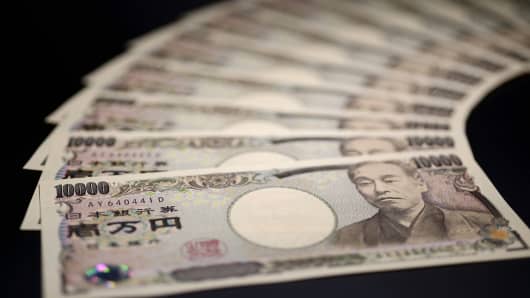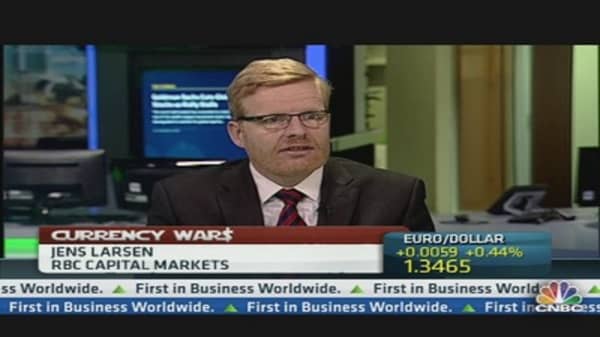The euro fell 0.6 percent versus the yen to 125.74 yen. On Feb. 6 it hit a nearly three-year high of 127.71 yen. The common currency has risen about 10 percent against the yen, leading to strong protests from some European leaders that a strong euro would hurt a fragile economic recovery.
The yen tumbled earlier in the global session after the G7 currency statement, as markets initially thought Japan had received a green light to continue efforts to reflate its economy.
(Read More: Could Weak Euro Zone GDP Spell End to Austerity?)
"Today's official response from the G7 on ... currency wars raised the stakes for this week's G20 meeting at which Japan may find itself on the hot seat over its aggressive policies to effectively cheapen the yen as a ticket to economic prosperity," said Joe Manimbo, senior market analyst, at Western Union Business Solutions in Washington.
Currency Wars Talk 'Overdone'
The euro was up 0.3 percent against the dollar at $1.3452, benefiting from its rise versus the yen. Gains accelerated after European Central Bank President Mario Draghi said talk about a currency war is way overdone.
Atlanta Federal Reserve Bank President Dennis Lockhart also echoed Draghi's comments, saying that there is no currency war. He declined to comment, however, on the yen's weakness.
Concerns about a bailout for Cyprus, a Spanish political scandal and Italy in the run-up to Feb. 24-25 elections are likely to check gains in the euro.
Jonathan Lewis, founding principal and chief investment officer at Samson Capital Advisors, was not particularly impressed with the euro and has brought his roughly $7 billion fund's "slight overweight" on the currency to "underweight."
"There are green shoots in the euro and there are some positive aspects, but this is not a reason to take the euro to the higher end of the trading range," said Lewis. "There are some outstanding issues in the euro zone and we think the euro in the upper $1.30s is fully valued."
In European bond markets, Spain sold 5.6 billion euros of 6- and 12-month debt, beating the top end of the target amount, but paid a higher yield on the longer-term paper as a political corruption scandal weighed on shaky confidence.
In the United States, the focus will be on the evening's State of the Union address by President Barack Obama for any signs of a deal to avert automatic spending cuts due to take effect March 1.




